Генри Джеймс - The Sacred Fount
Здесь есть возможность читать онлайн «Генри Джеймс - The Sacred Fount» — ознакомительный отрывок электронной книги совершенно бесплатно, а после прочтения отрывка купить полную версию. В некоторых случаях можно слушать аудио, скачать через торрент в формате fb2 и присутствует краткое содержание. Жанр: foreign_antique, foreign_prose, foreign_sf, на английском языке. Описание произведения, (предисловие) а так же отзывы посетителей доступны на портале библиотеки ЛибКат.
- Название:The Sacred Fount
- Автор:
- Жанр:
- Год:неизвестен
- ISBN:нет данных
- Рейтинг книги:5 / 5. Голосов: 1
-
Избранное:Добавить в избранное
- Отзывы:
-
Ваша оценка:
- 100
- 1
- 2
- 3
- 4
- 5
The Sacred Fount: краткое содержание, описание и аннотация
Предлагаем к чтению аннотацию, описание, краткое содержание или предисловие (зависит от того, что написал сам автор книги «The Sacred Fount»). Если вы не нашли необходимую информацию о книге — напишите в комментариях, мы постараемся отыскать её.
The Sacred Fount — читать онлайн ознакомительный отрывок
Ниже представлен текст книги, разбитый по страницам. Система сохранения места последней прочитанной страницы, позволяет с удобством читать онлайн бесплатно книгу «The Sacred Fount», без необходимости каждый раз заново искать на чём Вы остановились. Поставьте закладку, и сможете в любой момент перейти на страницу, на которой закончили чтение.
Интервал:
Закладка:
Henry James
The Sacred Fount
I
IT was an occasion, I felt—the prospect of a large party—to look out at the station for others, possible friends and even possible enemies, who might be going. Such premonitions, it was true, bred fears when they failed to breed hopes, though it was to be added that there were sometimes, in the case, rather happy ambiguities. One was glowered at, in the compartment, by people who on the morrow, after breakfast, were to prove charming; one was spoken to first by people whose sociability was subsequently to show as bleak; and one built with confidence on others who were never to reappear at all—who were only going to Birmingham. As soon as I saw Gilbert Long, some way up the platform, however, I knew him as an element. It was not so much that the wish was father to the thought as that I remembered having already more than once met him at Newmarch. He was a friend of the house—he wouldn't be going to Birmingham. I so little expected him, at the same time, to recognise me that I stopped short of the carriage near which he stood—I looked for a seat that wouldn't make us neighbours.
I had met him at Newmarch only—a place of a charm so special as to create rather a bond among its guests; but he had always, in the interval, so failed to know me that I could only hold him as stupid unless I held him as impertinent. He was stupid in fact, and in that character had no business at Newmarch; but he had also, no doubt, his system, which he applied without discernment. I wondered, while I saw my things put into my corner, what Newmarch could see in him—for it always had to see something before it made a sign. His good looks, which were striking, perhaps paid his way—his six feet and more of stature, his low-growing, tight-curling hair, his big, bare, blooming face. He was a fine piece of human furniture—he made a small party seem more numerous. This, at least, was the impression of him that had revived before I stepped out again to the platform, and it armed me only at first with surprise when I saw him come down to me as if for a greeting. If he had decided at last to treat me as an acquaintance made, it was none the less a case for letting him come all the way. That, accordingly, was what he did, and with so clear a conscience, I hasten to add, that at the end of a minute we were talking together quite as with the tradition of prompt intimacy. He was good-looking enough, I now again saw, but not such a model of it as I had seemed to remember; on the other hand his manners had distinctly gained in ease. He referred to our previous encounters and common contacts—he was glad I was going; he peeped into my compartment and thought it better than his own. He called a porter, the next minute, to shift his things, and while his attention was so taken I made out some of the rest of the contingent, who were finding or had already found places.
This lasted till Long came back with his porter, as well as with a lady unknown to me and to whom he had apparently mentioned that our carriage would pleasantly accommodate her. The porter carried in fact her dressing-bag, which he put upon a seat and the bestowal of which left the lady presently free to turn to me with a reproach: "I don't think it very nice of you not to speak to me." I stared, then caught at her identity through her voice; after which I reflected that she might easily have thought me the same sort of ass as I had thought Long. For she was simply, it appeared, Grace Brissenden. We had, the three of us, the carriage to ourselves, and we journeyed together for more than an hour, during which, in my corner, I had my companions opposite. We began at first by talking a little, and then as the train—a fast one—ran straight and proportionately bellowed, we gave up the effort to compete with its music. Meantime, however, we had exchanged with each other a fact or two to turn over in silence. Brissenden was coming later—not, indeed, that that was such a fact. But his wife was informed—she knew about the numerous others; she had mentioned, while we waited, people and things: that Obert, R.A., was somewhere in the train, that her husband was to bring on Lady John, and that Mrs. Froome and Lord Lutley were in the wondrous new fashion—and their servants too, like a single household—starting, travelling, arriving together. It came back to me as I sat there that when she mentioned Lady John as in charge of Brissenden the other member of our trio had expressed interest and surprise—expressed it so as to have made her reply with a smile: "Didn't you really know?" This passage had taken place on the platform while, availing ourselves of our last minute, we hung about our door.
"Why in the world should I know?"
To which, with good nature, she had simply returned: "Oh, it's only that I thought you always did!" And they both had looked at me a little oddly, as if appealing from each other. "What in the world does she mean?" Long might have seemed to ask; while Mrs. Brissenden conveyed with light profundity: " You know why he should as well as I, don't you?" In point of fact I didn't in the least; and what afterwards struck me much more as the beginning of my anecdote was a word dropped by Long after someone had come up to speak to her. I had then given him his cue by alluding to my original failure to place her. What in the world, in the year or two, had happened to her? She had changed so extraordinarily for the better. How could a woman who had been plain so long become pretty so late?
It was just what he had been wondering. "I didn't place her at first myself. She had to speak to me. But I hadn't seen her since her marriage, which was—wasn't it?—four or five years ago. She's amazing for her age."
"What then is her age?"
"Oh—two or three-and-forty."
"She's prodigious for that. But can it be so great?"
"Isn't it easy to count?" he asked. "Don't you remember, when poor Briss married her, how immensely she was older? What was it they called it?—a case of child-stealing. Everyone made jokes. Briss isn't yet thirty." No, I bethought myself, he wouldn't be; but I hadn't remembered the difference as so great. What I had mainly remembered was that she had been rather ugly. At present she was rather handsome. Long, however, as to this, didn't agree. "I'm bound to say I don't quite call it beauty."
"Oh, I only speak of it as relative. She looks so well—and somehow so 'fine.' Why else shouldn't we have recognised her?"
"Why indeed? But it isn't a thing with which beauty has to do." He had made the matter out with an acuteness for which I shouldn't have given him credit. "What has happened to her is simply that—well, that nothing has."
"Nothing has happened? But, my dear man, she has been married. That's supposed to be something."
"Yes, but she has been married so little and so stupidly. It must be desperately dull to be married to poor Briss. His comparative youth doesn't, after all, make more of him. He's nothing but what he is. Her clock has simply stopped. She looks no older—that's all."
"Ah, and a jolly good thing too, when you start where she did. But I take your discrimination," I added, "as just. The only thing is that if a woman doesn't grow older she may be said to grow younger; and if she grows younger she may be supposed to grow prettier. That's all—except, of course, that it strikes me as charming also for Brissenden himself. He had the face, I seem to recall, of a baby; so that if his wife did flaunt her fifty years–!"
"Oh," Long broke in, "it wouldn't have mattered to him if she had. That's the awfulness, don't you see? of the married state. People have to get used to each other's charms as well as to their faults. He wouldn't have noticed. It's only you and I who do, and the charm of it is for us ."
Читать дальшеИнтервал:
Закладка:
Похожие книги на «The Sacred Fount»
Представляем Вашему вниманию похожие книги на «The Sacred Fount» списком для выбора. Мы отобрали схожую по названию и смыслу литературу в надежде предоставить читателям больше вариантов отыскать новые, интересные, ещё непрочитанные произведения.
Обсуждение, отзывы о книге «The Sacred Fount» и просто собственные мнения читателей. Оставьте ваши комментарии, напишите, что Вы думаете о произведении, его смысле или главных героях. Укажите что конкретно понравилось, а что нет, и почему Вы так считаете.












